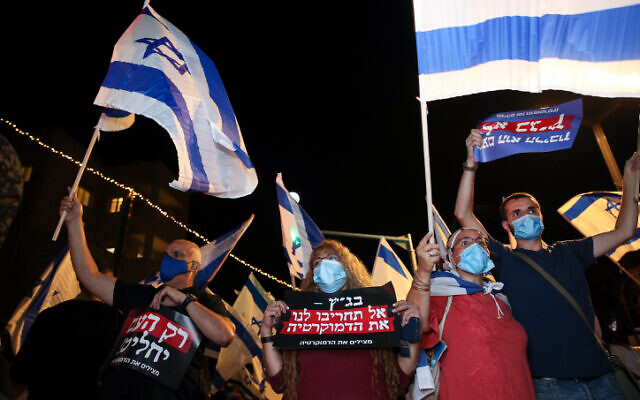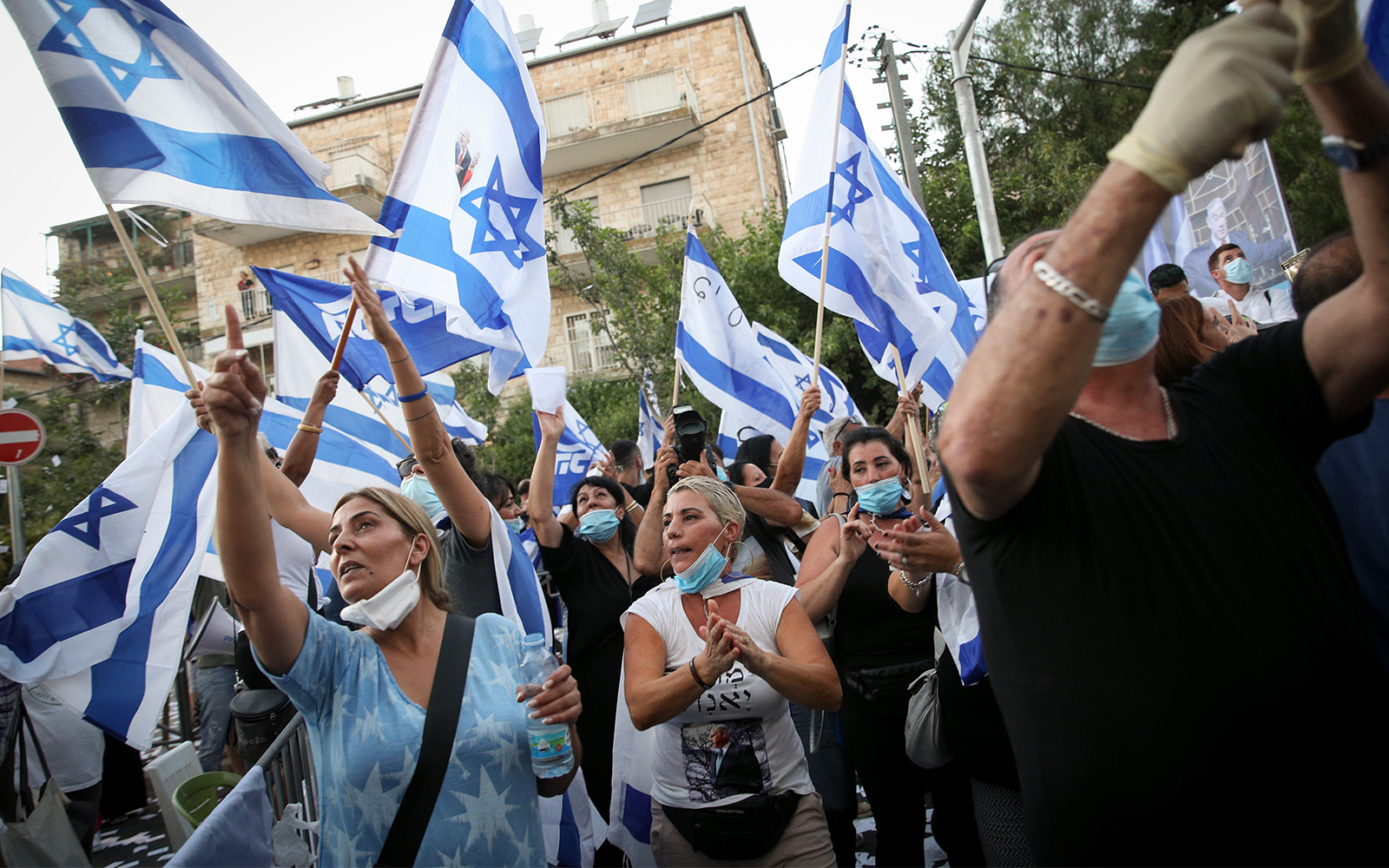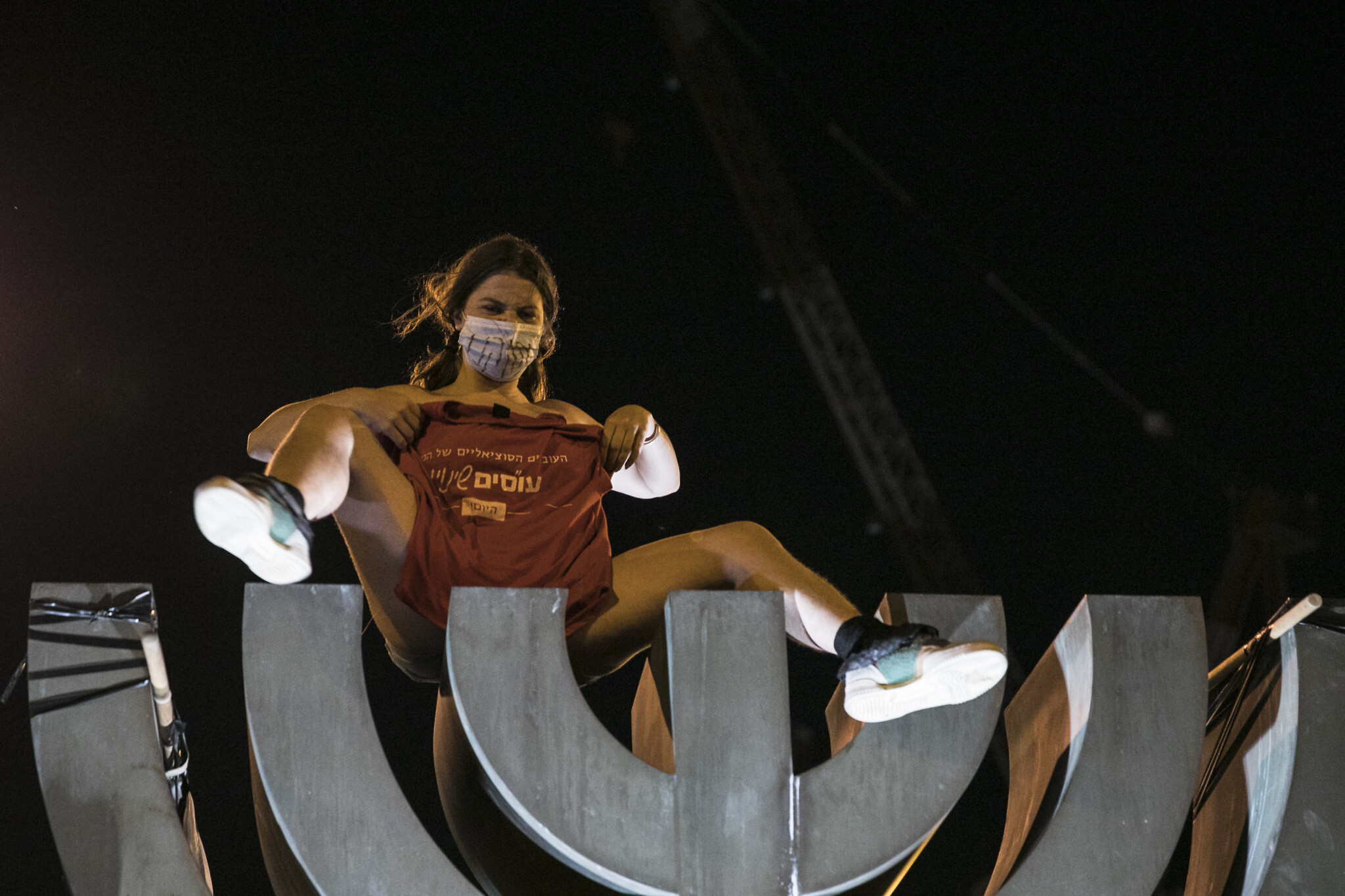5 arrested as police begin to forcibly disperse anti-government demonstrators; several hundred at counter-protest; some women remove tops, imitating Tuesday protester
Thousands of demonstrators massed on Thursday night near the Prime Minister’s Residence in Jerusalem to protest against the government of Prime Minister Benjamin Netanyahu.
Several hundred pro-Netanyahu protesters held a counter-rally nearby.
As an 11 p.m. deadline to end both events passed. police began to forcibly evacuate those gathered, including using riot dispersal methods such as water cannons.
Channel 12 news reported that five people were arrested, though some of them reportedly for selling alcohol to demonstrators without a permit.
Police initially sent out a statement saying that a confirmed coronavirus carrier had been removed from the protest, but later rescinded the claim and said the protester was no longer required to isolate.
Anti-Netanyahu protesters have been holding regular rallies outside his official residence on Jerusalem’s Balfour Street, calling on the premier to resign due to his indictment on corruption charges. Rallies against Netanyahu’s economic policies during the coronavirus pandemic have also been held, though mostly in Tel Aviv.
The large counter-protest in support of Netanyahu was the first of its kind since the start of the recent wave of demonstrations against the premier.

According to the Kan public broadcaster, some scuffles broke out between the two sides.
Police had granted permission for the protests to continue until 11 p.m., with acting police chief Motti Cohen urging the sides to “maintain a protest free of violence and unrest and to adhere to police instructions.”
The two crowds were separated by several hundred meters, with a large number of policemen on scene to keep them apart and to protect the premier’s residence on Balfour street. The streets around the demonstrations were blocked to traffic.
A number of women removed their shirts at the anti-Netanyahu protest near the prime minister’s residence, following the example of a protester who raised a firestorm by removing her shirt on Tuesday while on a menorah statue near the Knesset.
The women held up signs with the words “tits photograph better than…” followed by various words written on their chests, including “occupation” and “police violence.” One held a sign calling for “Justice for Iyad,” in reference to Iyad Halak, an autistic Palestinian man killed by police in Jerusalem in late May.
גל המחאה | מפגינות חשופות חזה בהפגנה בכיכר פריז, נושאות שלטים נגד הכיבוש ואלימות משטרתית@Shira_HN pic.twitter.com/06s4bhiEiL
— כאן חדשות (@kann_news) July 23, 2020
There have been occasional scenes of violence at recent protests, and police were reportedly wary of further clashes. Protesters have also accused police of using excessive force during the demonstrations.
Netanyahu in a Thursday night press conference on the coronavirus, held during the protest, said to the demonstrators: “Don’t drag the state into anarchy, violence, and destruction of property. Don’t drag it into attacks on police; they’re doing their jobs.”
Supporters of Netanyahu at the rally included Likud MKs Shlomo Karai and Ariel Kallner, the Ynet news site reported.

At the anti-Netanyahu rally, demonstrators held signs with slogans including, “We won’t stop fighting for the state,” “I have no other land,” and “Fed up with corruption.”
Anti-Netanyahu protests have been going on for several years, led by a core group of older protesters, but in recent weeks have drawn in a younger cohort. The financial crisis and soaring unemployment caused by the COVID-19 pandemic seem to have provided the impetus for younger people to join their elders on the streets.
Amir Haskel, a former Israeli Air Force general who has become a prominent figure in the anti-Netanyahu protests, told Ynet: “Tonight’s protest is a protest of young people. We expect very many of them and hope that the protest ends without violence.”
The organizers said in a statement: “Thousands of young people that are coming out to protest are not victims of the coronavirus — they’re victims of the [governmental] corruption of Benjamin Netanyahu.”
Demonstrations against Netanyahu, which organizers dubbed the “Siege of Balfour,” took place near his residence on several nights last week.
The events have veered between a carnivalesque atmosphere, with circus performers and meditation circles, and violence, including a controversial incident Tuesday night when a police officer was filmed and photographed digging his knee into the neck of a protester.
A student at a protest on Tuesday raised a firestorm by removing her shirt while atop a menorah statue near the Knesset.

Israel’s spiraling coronavirus crisis, and the economic effects of its second wave, have ratcheted up tensions in the country and caused a steep drop in Netanyahu’s approval ratings.
On Saturday, 28 anti-government protesters were arrested during mass demonstrations in Jerusalem and Tel Aviv, which turned violent as they came to a close. Judges on Sunday ordered the release of all of the detainees.
Both demonstrations on Saturday evening drew in several thousand Israelis, with the Tel Aviv rally focusing on the government’s economic policies amid the resurgent coronavirus pandemic and the Jerusalem one calling on Netanyahu to resign over his corruption trial.
In both cities, protests began in areas designated by police but later spilled over into the streets, with demonstrators marching through the cities, blocking roads and sometimes clashing with cops.
As reported by The Times of Israel
